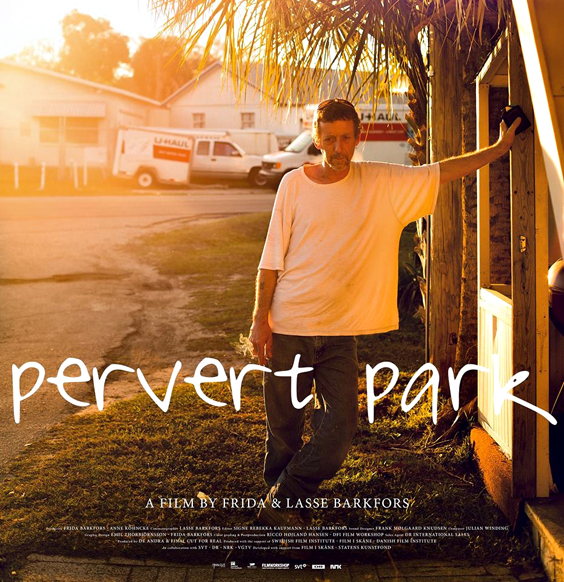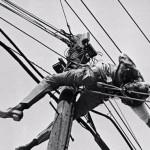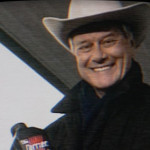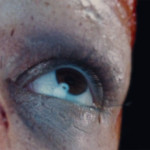HOT DOCS 2015: “PERVERT PARK”
First time feature filmmakers Lasse and Frida Barkfors’ frank portrait of a trailer park for sex offenders on probation has its final Hot Docs screening tonight at 7:00pm (Details and tix HERE). A unique community created out of a need to house offenders who aren’t allowed to live within 1000 feet of any space where children might congregate (schools, churches, playgrounds, bus stops etc), Florida Justice Transitions (known as “pervert park” to those in the outlying neighbourhoods) hosts over 100 residents in a two-year program aimed at re-integrating them into society. The film frames moving confessional interviews with a cast of characters who have committed atrocious crimes against children against a backdrop of inevitable questions about social justice, and what to do with people society would eagerly prefer to see written off.
Spectacular Optical managed to chat briefly with the filmmakers, who are visiting from Denmark for PERVERT PARK’s Canadian Premiere.
++++
Kier-La Janisse: There are so few films out there that give sexual offenders the opportunity to speak. People don’t want to hear they have to say, so it’s very rare to get a film like this that will go into a community with sexual offenders and let them speak for themselves. So how did you hear about this park?
Frida Barkfors: We read about it in a Danish newspaper about five years ago, and the funny thing is that it wasn’t that deliberate going in with such an open mind. As you say, the film ended up being just listening to them. But we were just like everyone else, we didn’t question the stereotypes around sex offenders, we just thought what you see is what you get. So we had this kind of anthropological film in mind where we thought we were going to depict like a parallel universe. But when we got there to research we just spent some time with them, listened to their stories and talked to them, and by doing that is how we started to understand that there was more to them than the stereotype. It was very natural how it happened.
Lasse Barkfors: Our task was really to show what we saw there. To make a portrait of the place that was as close as possible to what we witnessed.
KJ: So how long were you there, researching, filming, and what kind of legal hoops did you have to go through to get permission to film people on probation?
FB: Oh that was easy. We just asked and they said yes right away.
LB: And it’s all public, even their pictures.
FB: Yes, even the mugshots we use at the end, I wanted to make sure everything was in order so I called the authorities in the States and they said it’s a public registry so the pictures are for public use. They basically have no rights – that’s why they can make the apps where you can see all the registered sex offenders that live in your community, because they don’t have any personal protection in that sense.
LB: We went there for the research trip for probably two weeks, and then we went back and tried to fund the film and that took us forever…
FB: In other words, three years.
LB: Yes, so three years later we came back and shot the film, and we had very little money so we only had 23 days to shoot the whole film. But by then we had such good contacts there and they knew exactly what we wanted to do..
KJ: So three years later there were still the same people?
FB: Well, some of them. But I would say many of the residents stay only for the two years that the program runs for and then they want out. But it’s kind of slowly turning into this retirement place for the older people that may not have family left the way some of the younger residents do.
KJ: So the older people want to stay in that community even after the program ends?
FB: Exactly.
KJ: What percentage of them are women?
FB: All the female residents that were in the park, you see in the film. There were three living in the park at the time that we were filming, and one ex-resident, so four out of 120 residents.
LB: And there’s a really interesting point that Don [the social worker in the film] gave to us; he told us that of all the men he has treated for thirty years, approximately 50% of them have been abused by women.
FB: There are so many stereotypes about the way we see sex offenders that it doesn’t help the problem at all. Sex abuse is very often learned behavior, as opposed to pedophilia. Pedophilia is sexual orientation, you can’t get rid of that. And it doesn’t even mean you’re a sex offender if you’re a pedophile – you can be a very moral person and know that this is what you desire but you’re not going to act on it.
KJ: Did you ever see the movie CHICKENHAWK?
FB: No, what’s that?
KJ: It’s about NAMBLA, an advocacy group for pedophiles, but half the people in the movie have never done anything illegal. But everybody that you interviewed had abused children. Was that a choice going in, or was that just who happened to be in the park? Because obviously there are all kinds of sex offenders but the people interviewed in the film are all people who have abused children. So it gives the impression that the park is specifically for those kinds of sexual offenders.
FB: I would say most people in the park are abusers of people under the age of 18. But that wasn’t one of the things that made us choose our subjects, we wanted to cover the whole spectrum. So we had Patrick, the one who had committed the worst crime in the park, who had raped the five-year old girl and left her in the desert, and we wanted a “Romeo and Juliet” case, where they have a consensual relationship but either the parents go to the police or she goes to the police after a fight, and in those cases he can be 19 and she can be 17 but it still counts as illegal. We wanted a case study like that but there wasn’t such a case in the park at the time. But we also needed them to be articulate on camera, so that was a big part of how we chose.
LB: And there are a lot of different cases, there are porn addicts, with people who just get caught with a lot of porn on their computer, and there are a lot of entrapment cases.
KJ: That was another that seemed quite common was how many of them had been caught because of online chat rooms. But they’re caught in person, because they are physically going to the person’s house, to respond to the exchange online?
LB: Yes.
KJ: So what is your personal view on this kind of fishing?
FB: Well, I just have to be clear that we never wanted this film to be a film against “the system”. Because then we would lose the whole idea of just listening to their stories and humanizing them.
LB: And understanding where they come from so you can stop the circle.
FB: Otherwise it would be an activist film, but this is more about asking who are they, where do they come from and how do we stop it.
LB: But we can say that entrapment is ruled unconstitutional elsewhere in the US and it’s only happening in Florida.
KJ: And according to the film, the statistics for sexual offenders are significantly higher in Florida.
FB: And this is the thing we don’t want to answer, this is up to the viewer…but it’s an interesting question.
KJ: There’s a term you bring up in the film: A “crime of opportunity.” Can you explain a bit about what a crime of opportunity is?
FB: This is something that people who are still coming to terms with what they do, they use that term in order to justify their actions. So if he says “I wouldn’t have done it if my wife hadn’t gone out”. But in real life the counsellors say there is no “crime of opportunity”. But this applies to other people to, you could be in love with someone and say “oh, I need to buy some shoes from the store that is right next to their house,” because you know there’s a chance you could run into him. It’s just justification of your actions.
KJ: But there’s one case in the film, with the man who was gay and had not come out, and he had solicited two little boys [which is what he was charged with] and later said this was an unconscious way of exploring this in a “safe” way before he was comfortable coming out. So now that he has come out, do you think the chances that he would re-offend with a child are minimized?
LB: Yes, very minimized.
KJ: So you think in that case, that was a “crime of opportunity”?
LB: No. But the thing is, if they could talk about this before acting out, that could maybe help a lot of them. And with his case it’s more complex because he was also abused himself, by an older friend when he was a kid. But the problem is that if someone has these thoughts and they go to a therapist, the therapist has to turn them in.
KJ: What did your own friends and family think about you spending time in this community?
FB: My parents are pretty liberal, so they were fine, but I think my mom was more interested than my dad – I think we changed my dad’s mind a bit. And my parents came with us when we went to the US to shoot because we have a son and they took care of him, so of course we talked a lot about the process, but they never went to the park.
KJ: Did you always feel the people in the park were being fully honest with you?
FB: It’s a difficult question – we knew there was a big chance that they wouldn’t be, so throughout the interviews we checked what they were saying with both a counsellor and the CEO of the park who had their files. Just to make sure they weren’t “minimizing” and what they said was true.
LB: Also, we have stories told in private before the camera but then they are also told in therapy classes, in front of the counsellor and all the other residents who know them pretty well, so they can’t really lie in that forum.
KJ: Some of the stories you got were just heartbreaking. Like the woman, Tracy, who had a relationship with her dad as an adult, I found that the hardest to understand, but I have read books by other people who have had similar experiences. Like the actress Mackenzie Phillips, who had a sexual relationship as an adult with her father, who was the singer for The Mamas and the Papas. But she also said it’s easy to look at something as “consensual” while ignoring all the pressures to consent – such as a need for approval, the fact that this is an authoritarian person in your life, and it’s not an equal relationship.
FB: But those kinds of relationships, as hard as it is to understand, are still based on love. They are just a very confused idea of what certain types of love should look like. But Tracy in the film, she truly loved her son, and she truly loved her father, and there is no way you can deny that.
++++

 May 1, 2015
May 1, 2015  No Comments
No Comments






